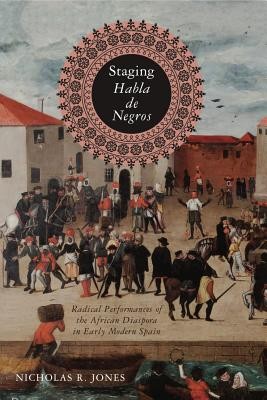
- We will send in 10–14 business days.
- Author: Nicholas R Jones
- Publisher: Penn State University Press
- ISBN-10: 0271083468
- ISBN-13: 9780271083469
- Format: 16 x 23.6 x 2 cm, kieti viršeliai
- Language: English
- SAVE -10% with code: EXTRA
Reviews
Description
In this volume, Nicholas R. Jones analyzes white appropriations of black African voices in Spanish theater from the 1500s through the 1700s, when the performance of Africanized Castilian, commonly referred to as habla de negros (black speech), was in vogue.
Focusing on Spanish Golden Age theater and performative poetry from authors such as Calderón de la Barca, Lope de Rueda, and Rodrigo de Reinosa, Jones makes a strong case for revising the belief, long held by literary critics and linguists, that white appropriations and representations of habla de negros language are "racist buffoonery" or stereotype. Instead, Jones shows black characters who laugh, sing, and shout, ultimately combating the violent desire of white supremacy. By placing early modern Iberia in conversation with discourses on African diaspora studies, Jones showcases how black Africans and their descendants who built communities in early modern Spain were rendered legible in performative literary texts.
Accessibly written and theoretically sophisticated, Jones's groundbreaking study elucidates the ways that habla de negros animated black Africans' agency, empowered their resistance, and highlighted their African cultural retentions. This must-read book on identity building, performance, and race will captivate audiences across disciplines.
EXTRA 10 % discount with code: EXTRA
The promotion ends in 23d.03:04:21
The discount code is valid when purchasing from 10 €. Discounts do not stack.
- Author: Nicholas R Jones
- Publisher: Penn State University Press
- ISBN-10: 0271083468
- ISBN-13: 9780271083469
- Format: 16 x 23.6 x 2 cm, kieti viršeliai
- Language: English English
In this volume, Nicholas R. Jones analyzes white appropriations of black African voices in Spanish theater from the 1500s through the 1700s, when the performance of Africanized Castilian, commonly referred to as habla de negros (black speech), was in vogue.
Focusing on Spanish Golden Age theater and performative poetry from authors such as Calderón de la Barca, Lope de Rueda, and Rodrigo de Reinosa, Jones makes a strong case for revising the belief, long held by literary critics and linguists, that white appropriations and representations of habla de negros language are "racist buffoonery" or stereotype. Instead, Jones shows black characters who laugh, sing, and shout, ultimately combating the violent desire of white supremacy. By placing early modern Iberia in conversation with discourses on African diaspora studies, Jones showcases how black Africans and their descendants who built communities in early modern Spain were rendered legible in performative literary texts.
Accessibly written and theoretically sophisticated, Jones's groundbreaking study elucidates the ways that habla de negros animated black Africans' agency, empowered their resistance, and highlighted their African cultural retentions. This must-read book on identity building, performance, and race will captivate audiences across disciplines.


Reviews